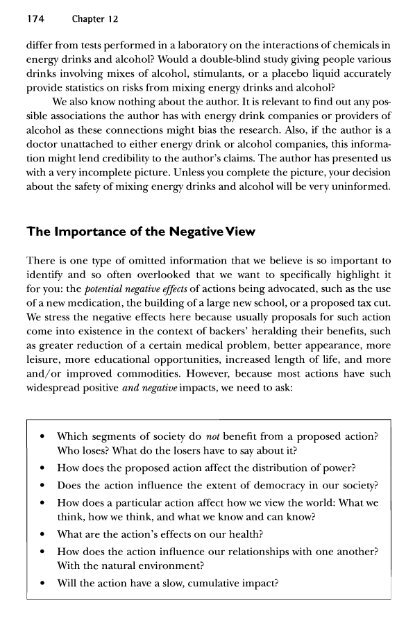Asking the Right Questions, A Guide to Critical Thinking, 8th Ed
Asking the Right Questions, A Guide to Critical Thinking, 8th Ed
Asking the Right Questions, A Guide to Critical Thinking, 8th Ed
Create successful ePaper yourself
Turn your PDF publications into a flip-book with our unique Google optimized e-Paper software.
174 Chapter 12<br />
differ from tests performed in a labora<strong>to</strong>ry on <strong>the</strong> interactions of chemicals in<br />
energy drinks and alcohol? Would a double-blind study giving people various<br />
drinks involving mixes of alcohol, stimulants, or a placebo liquid accurately<br />
provide statistics on risks from mixing energy drinks and alcohol?<br />
We also know nothing about <strong>the</strong> author. It is relevant <strong>to</strong> find out any possible<br />
associations <strong>the</strong> author has with energy drink companies or providers of<br />
alcohol as <strong>the</strong>se connections might bias <strong>the</strong> research. Also, if <strong>the</strong> author is a<br />
doc<strong>to</strong>r unattached <strong>to</strong> ei<strong>the</strong>r energy drink or alcohol companies, this information<br />
might lend credibility <strong>to</strong> <strong>the</strong> author's claims. The author has presented us<br />
with a very incomplete picture. Unless you complete <strong>the</strong> picture, your decision<br />
about <strong>the</strong> safety of mixing energy drinks and alcohol will be very uninformed.<br />
The Importance of <strong>the</strong> Negative View<br />
There is one type of omitted information that we believe is so important <strong>to</strong><br />
identify and so often overlooked that we want <strong>to</strong> specifically highlight it<br />
for you: <strong>the</strong> potential negative effects of actions being advocated, such as <strong>the</strong> use<br />
of a new medication, <strong>the</strong> building of a large new school, or a proposed tax cut.<br />
We stress <strong>the</strong> negative effects here because usually proposals for such action<br />
come in<strong>to</strong> existence in <strong>the</strong> context of backers' heralding <strong>the</strong>ir benefits, such<br />
as greater reduction of a certain medical problem, better appearance, more<br />
leisure, more educational opportunities, increased length of life, and more<br />
and/or improved commodities. However, because most actions have such<br />
widespread positive and negative impacts, we need <strong>to</strong> ask:<br />
• Which segments of society do not benefit from a proposed action?<br />
Who loses? What do <strong>the</strong> losers have <strong>to</strong> say about it?<br />
• How does <strong>the</strong> proposed action affect <strong>the</strong> distribution of power?<br />
• Does <strong>the</strong> action influence <strong>the</strong> extent of democracy in our society?<br />
• How does a particular action affect how we view <strong>the</strong> world: What we<br />
think, how we think, and what we know and can know?<br />
• What are <strong>the</strong> action's effects on our health?<br />
• How does <strong>the</strong> action influence our relationships with one ano<strong>the</strong>r?<br />
With <strong>the</strong> natural environment?<br />
• Will <strong>the</strong> action have a slow, cumulative impact?



